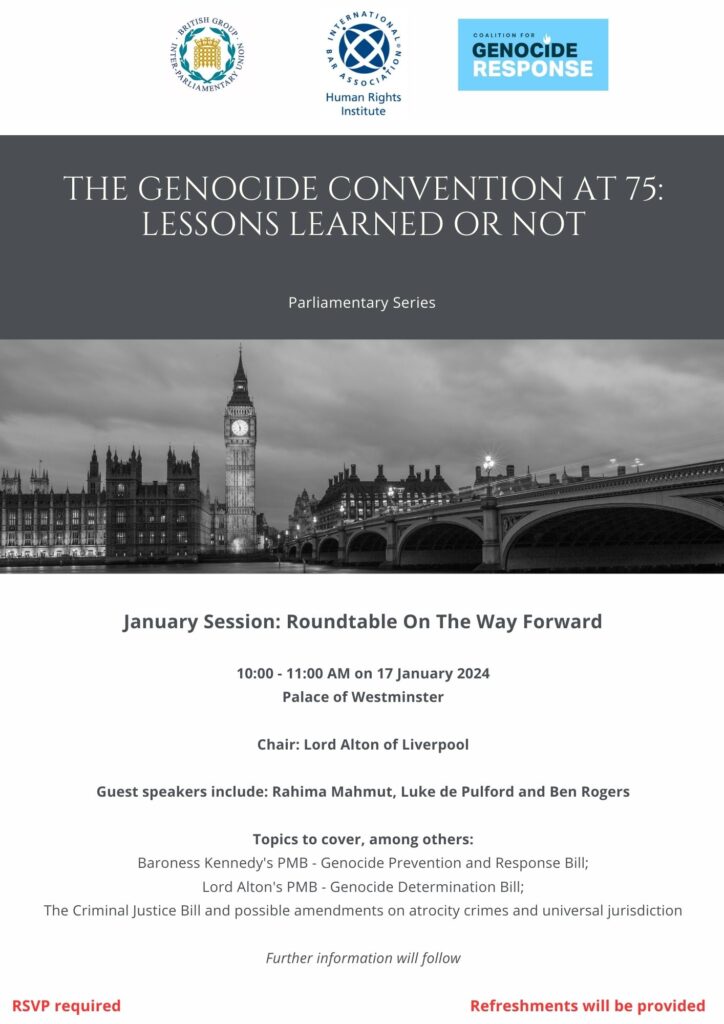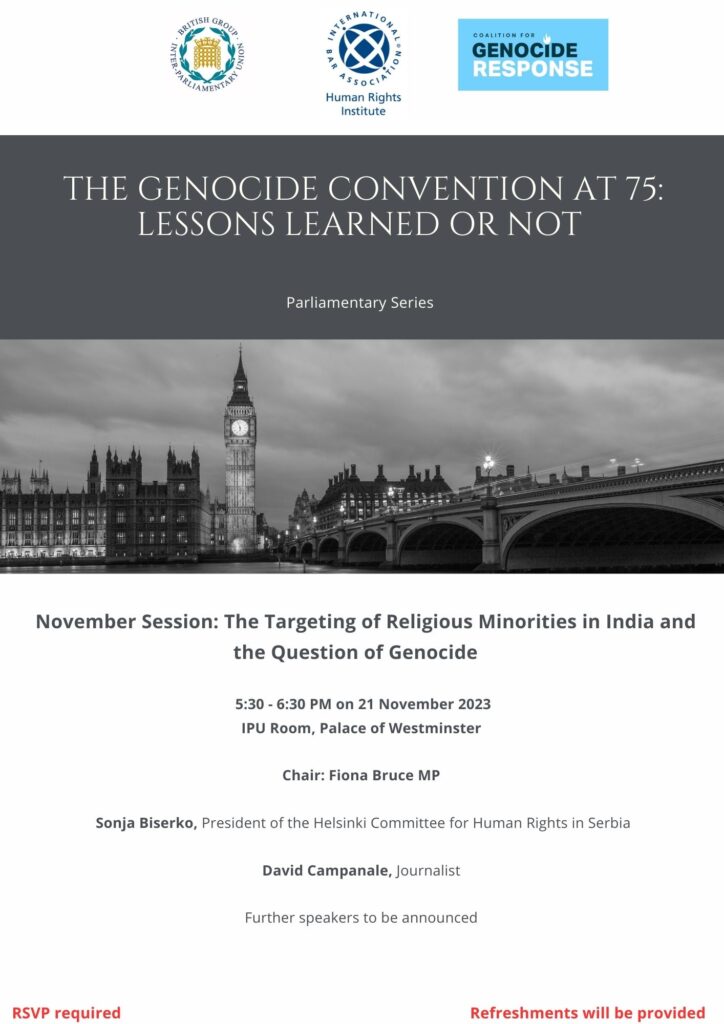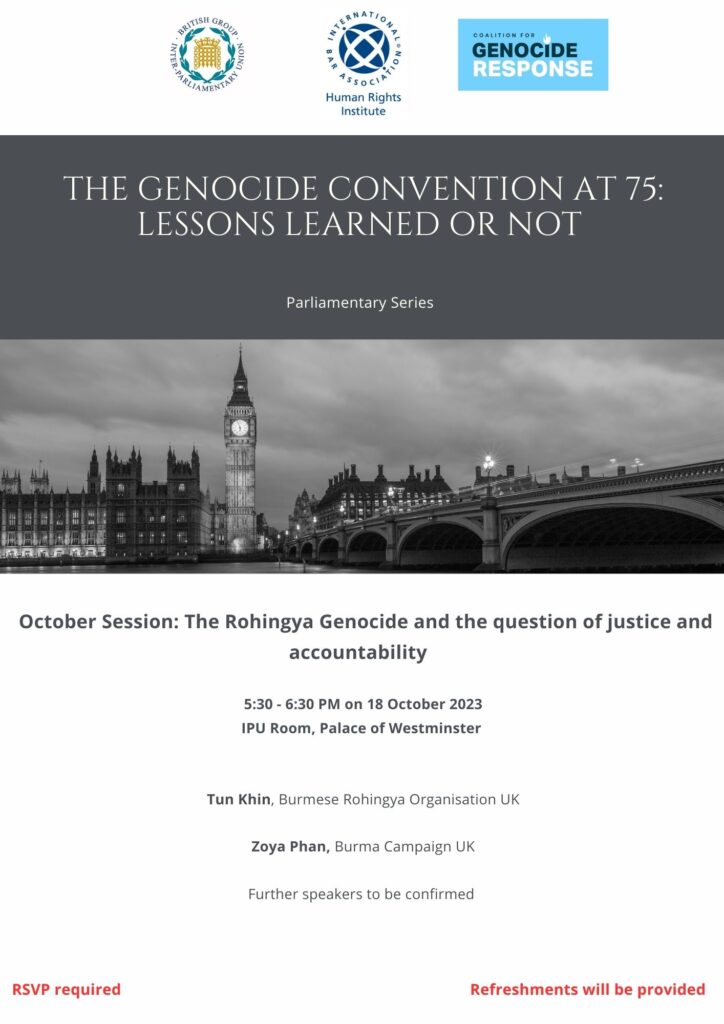9 December marks the International Day of Commemoration and Dignity of the Victims of the Crime of Genocide and of the Prevention of this Crime. In 2023, it is also the 75th anniversary of the UN General Assembly’s adoption of the 1948 Convention on the Prevention and Punishment of the Crime of Genocide (the Genocide Convention).
The Genocide Convention confirms that genocide, whether committed in time of peace or war, is a crime under international law which parties to the convention undertake ‘to prevent and to punish.’
Read more from the co-founder of the Coalition for Genocide Response, Dr Ewelina Ochab, writing for Forbes:
The last 75 years have seen too many cases of genocide. In the last decade, there have been several genocides or situations at serious risk of genocide that require attention here – genocides that we all have lived through, even if far from our homes.
In 2014, Daesh attacked Sinjar in Iraq and unleashed genocide against the Yazidi numeric minority community. Daesh perpetrated a litany of atrocities, including murder, enslavement, deportation and forcible transfer of populations, imprisonment, torture, abduction of women and children, exploitation, abuse, rape, and sexual violence. Daesh fighters killed hundreds if not thousands of people. As part of the same campaign, Daesh fighters abducted boys to turn them into child soldiers and women and girls for sex slavery. Subsequently, Daesh attacked Nineveh Plains forcing over 120,000 Christians to flee for their lives. More than 2,700 Yazidi women and children are still missing and their fate is unknown – as such, this genocide is considered as ongoing.
In 2016/2017, Myanmar’s military, the Tatmadaw, unleashed atrocities against the Rohingya, an ethnic and religious minority in Myanmar, including extrajudicial executions or other killings, including by random shooting, enforced disappearance and arbitrary detention, rape, including gang rape, and other forms of sexual violence; physical assault including beatings; torture, cruel, inhuman or degrading treatment or punishment; looting and occupation of property, destruction of property, and ethnic and religious discrimination and persecution. As a result of the atrocities, close to a million Rohingya Muslims were forced to flee to Bangladesh.
In 2018, we started hearing about the targeting of the Uyghurs, an ethno-religious community in China. According to reports, over a million members of the community were placed in so-called “re-education camps” where they would be subjected to forced indoctrination, torture and inhuman and degrading treatment, rape and sexual violence, and much more. Uyghur women were subjected to forced sterilizations and abortions. Uyghur children were removed from their parents and placed with Han families.
The targeting of the Yazidis, the Rohingya, and the Uyghurs has received some international attention and the atrocities have been formally determined to constitute genocide by governments, parliaments, international bodies, and experts, although the level of recognition varies between the cases. The U.S. State Department formally recognized all three.
However, recent years have also seen several situations with exhibit a serious risk of genocide, and situations where some of the elements of the crime are already present, although have not been formally recognized as yet. Among them are the situations of the Tigrayans in Ethiopia, the Hazara in Afghanistan, Ukrainians as targeted by Russia, and Darfurians in Sudan.
In 2020, with the outbreak of the war in Ethiopia, news reported on the targeting of Tigrayans with mass killings and brutal cases of rape and sexual violence. As the ceasefire was being signed in November 2022, the legacy of the war includes an estimated 600,000 – 800,000 people killed (making it the deadliest war in recent years), over 120,000 people subjected to conflict-related sexual violence, over a million people internally displaced within Tigray and over 60,000 fleeing to Sudan, thousands of people dead due to starvation. Despite the ceasefire in November 2022, the situation of the communities is still dire.
In 2021, as the Taliban was taking over, the Hazara, an ethnic but also a religious numeric minority group, became a target yet again. Hazara places of worship, schools and hospitals came under attack with countless causalities. There are continuous and increasing threats against the Hazara that include targeted kidnapping and arrest of Hazara leaders, scholars, and military members and their family members across Afghanistan. The Hazara Inquiry, a U.K. Parliamentary inquiry, found that Hazara in Afghanistan, as a religious and ethnic minority, are at serious risk of genocide at the hands of the Taliban and Islamic State–Khorasan Province (IS-K).
In 2022, Russia attacked Ukraine and unleashed a litany of crimes including atrocities aiming at the destruction of the Ukrainian identity. Among such crimes are the abductions of children, and forced transfer to Russia to subject them to illegal adoptions by Russian families. According to the testimonies of rescued children, once removed from their families or guardians, they were prohibited from speaking Ukrainian, and forced to learn and speak Russian. In 2023, the practice of removing Ukrainian children received some focus from the International Criminal Court (ICC). Indeed, in March 2023, the Pre-Trial Chamber II of the ICC issued warrants of arrest for two individuals in the context of the situation in Ukraine: Mr Vladimir Vladimirovich Putin and Ms Maria Alekseyevna Lvova-Belova and this for the war crime of unlawful deportation of population (children) and that of unlawful transfer of population (children) from occupied areas of Ukraine to the Russian Federation (under articles 8(2)(a)(vii) and 8(2)(b)(viii) of the Rome Statute). However, as for now, the ICC does not consider the crime as part of the genocide against Ukrainians.
In 2023, Darfur was issued a warning of the risk of imminent genocidal mass killing as the Rapid Support Forces (RSF), the paramilitary group in conflict with the Sudanese Armed Forces (SAF), was on the verge of taking over the entire Darfur region after capturing four of its five states. The warning issued by over 70 international law experts stated that the evidence of persecution and killings based on ethnicity is well-established. As they indicated, “In recent weeks, the RSF has become increasingly brazen in its attacks and brutality against civilians, particularly targeting the Masalit ethnic group directly. Earlier this month, in just six days, RSF forces terrorized an IDP camp in Ardamata, a site thought to be a place of refuge from prior attacks, massacring hundreds and enslaving members of the Masalit. This follows the RSF unleashing the same horrors on El Geneina earlier this year, leaving hastily dug mass graves for members of the Masalit community. According to survivors of these massacres, the RSF and its militiamen singled out Masalit for execution and further hunted down prominent leaders of the community.”
These are the cases from the last ten years where the elements of the crime of genocide are established or, at minimum, there is a serious risk of genocide. These findings should engage the responsibility of all States to protect the targeted communities and prevent genocide, under the Genocide Convention and customary international law. Unfortunately, the responses to these situations have been neglectful, and unworthy of the promise of “Never Again” repeated by leaders again and again.



